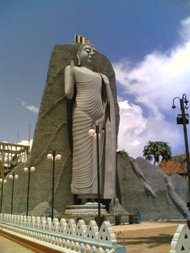Fatal Kindness!
As the elephant at the Udawalawe National Park caught sight of us, it sauntered near the electric fence and thumped its right fore limb on the ground. It was a sign of asking for sugarcane near the wayside stall on the opposite side. Even though sugarcane and leaves can be easily digested by an elephant, sweetmeats such as 'kavum' and 'kiribath' cannot be. But the practice of feeding them with these is commonplace.
Elephants nowadays have a keen sense of taste and are willing to eat food that is given by humans instead of tiring themselves in finding food. Though some may think that it is meritorious to feed elephants,more often than not it is bad for these animals.
The tragedy of an elephant falling sick and dying due to high consumption of sweetmeats has been an eye-opener for us to stop feeding elephants with such food. Dr. Ashok Dangolla, who investigated the recent death of the privately-owned elephant from Mawanella says "it is very difficult for the elephant's digestive system to breakdown the starchy food like 'kiribath' and 'kavum' that was given to it". He explained that the incident took place during the traditional water-cutting ceremony after the Esala Perahera conducted by the Dalada Maligawa, Kandy where thousands thronged to 'purify' themselves in the Holy Water after making vows and religious rituals.
They brought delicious sweetmeats and fed the elephants who were participating in the perahera. "When an elephant consumes food rich in carbohydrates, its stomach becomes bloated making it look obese and once they get used to the sweet food given by humans, they make it a habit of asking for it", explained Dr. Dangolla.
He further stated that it is not only at the Dalada Maligawa's Esala Perahera that such incidents can take place, but also at various temples such as Ruhuna and Kataragama around the island that have traditional peraheras.
Dr. Suhada Jayawardena of the Elephant Transit Home in Udawalawe explained that research was done on the eating habits of elephants "for example, we mixed margosa oil in cucumber to prevent elephants from eating such vegetables which are hazardous to their health". He said that because of the smell of oil, elephants wouldn't even touch them.
Favourites like 'kithul' bark and sugarcane have been in their diet for years. But today people eargerly wait to give elephants sweetmeats as a way of attracting these giant animals. "The action we must take is to stop feeding the elephants because it will develop into a pattern.
If their needs are not met, they are likely to get agitated like wild elephants", he said. Dr. Neshma Kumudini, an elephant researcher also said that people have to understand that feeding elephants with food normally consumed by humans is not a good thing and they should be careful especially when elephants make a fuss. "At the Udawalawe National Park, visitors who feed elephants are at the risk of being attacked due to the fact that the electric fence is charged at night and not during the day" she warned.
"Domesticated elephants like those at the Pinnawela Elephant Orphanage have been trained to eat food that are healthy and easily digestible; so feeding them the right diet is acceptable", said Dr. Jayawardena. Mahouts and elephant handlers are only authorised to give food to their elephants but should keep in mind that what they give should be done in limited servings. However, elephants are majestic animals that are part of nature, so humans shouldn't try to meddle with their lives and must 'live and let live'.





No comments:
Post a Comment